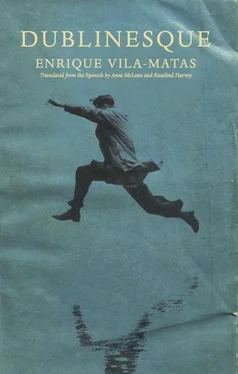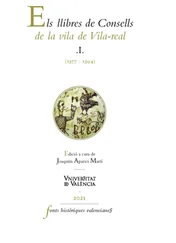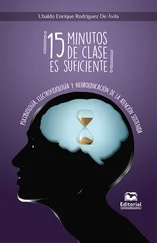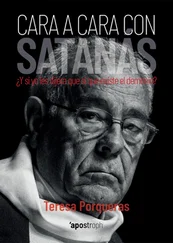“They actually want me to speak about the end of the age of print.”
Long silence.
“Are the presses closing down?” his mother asks.
His parents, who — as far as he knows — have not the slightest idea who Joyce is and even less what kind of novel lies behind the title Ulysses and who, moreover, have been caught off guard by the topic of the end of the age of print, look at him as if it’s just been confirmed that, even though it’s beneficial for his health, he’s been very odd lately, owing to his permanent sobriety since giving up alcohol so radically two years ago. He senses this is what his parents are thinking and fears greatly that they are not entirely in the wrong, since his constant sobriety is affecting him, why pretend otherwise? He is too connected to his thoughts and sometimes disconnects fatally for a few seconds and gives answers he should have thought through more, such as the one he has just given them about Ulysses and the Gutenberg galaxy.
He ought to have given them a different answer. But as Céline said, “Once you’re in, you’re in it up to your neck.” Now that he’s announced he is going to Dublin, he’s going to push on into the tangled affair, up to his neck, as far as is necessary. He will go to Dublin. No doubt about it. This will also allow him to verify whether or not the many extraordinarily precise details in his strange dream were real. If, for instance, he sees that in Dublin there is a pub called the Coxwold with a big red and black door, this will mean nothing less than that he really did cry with Celia, in an emotional scene, sitting on the ground, in Dublin, perhaps before he was ever there.
He will go to Dublin, capital of Ireland, a country he doesn’t know much about, only that, if he remembers correctly — he tells himself he’ll look it up later on Google — it has been an independent state since 1922, the very year — another coincidence — his parents were born. He knows very little about Ireland, although he knows a good deal about its literature. W. B. Yeats, for example, is one of his favorite poets. 1922 is, moreover, the year in which Ulysses was published. He could go and hold a funeral for the Gutenberg galaxy in Dublin Cathedral, which is called St. Patrick’s, if he remembers rightly; there, on that holy site, Antonin Artaud finally went completely mad when he saw no difference between the saint’s cane and the one he was using himself.
His parents are still looking at him as if thinking that his permanent sobriety has led him perilously down the pathways of autism; they seem to be reproaching him for daring to talk about someone called Joyce when he knows perfectly well they have no idea who this gentleman is.
His father turns around in his chair and appears to be about to protest, but finally says only that he would like someone to explain something.
Again? Now it seems like he’s parodying himself. Could it be a touch of humor on his part?
“What, Dad? The storm’s over. What else do we have to explain to you? The unfathomable dimension?”
Unperturbed, his father continues what he’s started, and now he wants to know why exactly they’ve chosen his son to speak in Dublin about the decline of the Gutenberg constellation. And he also wants to know why his son still hasn’t said anything at all about his trip to Lyon. Perhaps he didn’t really go there and wants to hide this from his parents. They are used to him telling them about his trips, and his behavior today is alarmingly anomalous.
“I don’t know, it could be you’ve got a lover and you didn’t go to Lyon with her, but up Tibidabo,” he says. “You’re really doing some things badly lately, and as your father I feel obliged to point this out.”
Riba is about to tell him that he went to Lyon simply to hold a funeral for all the literary theories still in the world, including the one he himself managed to devise in a hotel room there. He’d like to be able to say something like this to his father, because he doesn’t appreciate those last paternal words one bit. But he holds back, he controls himself. He stands up, and begins the ceremony of saying goodbye. After all, it’s not raining anymore. And in any case he knows that when his parents start telling him off, it’s usually just a trick to keep him in the house a little longer. He can’t stay there a minute longer. He realizes that sometimes he lets his father control his life too much. Not having had children and being, moreover, an only child has led to this ongoing state of strange childish submission, but there’s a limit to everything. Years ago, he used to fight a lot with his father. Later on, they made peace. But he thinks that, at times like these, he can sense a certain nostalgia for that period of big arguments, great clashes. As if his father enjoyed hand-to-hand combat more than the current haven of peace and mutual comprehension. What’s more, it’s possible that arguing makes his elderly father feel better, and he unconsciously seeks out confrontation.
Although it’s a recent feeling, in some ways he adores his father: his intelligence, his secret goodness, his unexploited writing talent. He would have liked to have published a novel of his. He adores this man, always so strict, so entrenched in his role as a nineteenth-century father, that he has created in his son the need to be a subordinate, to be such an obedient person that he often even finds himself thanking his father for trying to direct his steps.
“Do you really not want to tell us anything about Lyon? It’s very strange, son, very strange,” says his mother.
They seem determined to keep him there with trifling matters for as long as possible, as if they wanted to delay him from going home, maybe because deep down they have always believed that, even though he is married and a highly respected publisher of almost sixty years of age, when he’s here he is still in short trousers.
Marco Polo is leaving, he thinks of saying. But he keeps quiet, he knows this would make it worse. His father looks at him angrily. His mother reproaches him for having spoiled such a firmly established custom as that of telling them about his latest trip. They walk him to the door, but they don’t make it easy for him to get to the exit, practically blocking him with their bodies. “You’re grown up now,” says his father, “and I can’t understand why you’d want to go to Dublin just to see this friend of yours from the Ulysses family.”
The Ulysses family! This must be another touch of last-minute paternal humor or sarcasm. He calls the elevator which, as always, takes its time arriving, despite only having to come up one floor. His parents have never accepted that, given the short distance to the lobby, he might walk down the stairs, and he, meanwhile, never wished to be the callous son who breaks with the sacred tradition of always leaving in the same clunky old elevator, once so luxurious.
While they wait, he asks his father with childish sarcasm if he doesn’t like the fact his son has a friend. And he reminds him that as a child he didn’t let him have friends, and was always jealous of them. He is exaggerating, but in a way he is right to do so. Isn’t his father exaggerating too? Doesn’t his father, in his heart of hearts, want to forbid him to go to Dublin? So he rebels against him, against his father’s secret wish to stop him going to Ireland. But really he is acting as a small child would do, unable to seriously hurt his father, let alone kill him, as he thinks he remembers Freud recommended earnestly.
No matter how great his tendency or vocation for patience might be, and no matter how much heroic fiber he might be made of, the wait for the elevator seems to go on forever. Finally the hulking old thing comes, he says goodbye again to his parents, steps into the elevator, presses a button, and goes down. Such a huge relief; he breathes deeply. The descent to the lobby is, as ever, very slow; the elevator is very old. As he descends, he feels like he is leaving behind the whole saga of the patio of this mezzanine apartment on Calle Aribau, where as a child he played soccer, always eternally alone. Later on, this patio became the center of his happiest dream, his dream linked to New York.
Читать дальше












